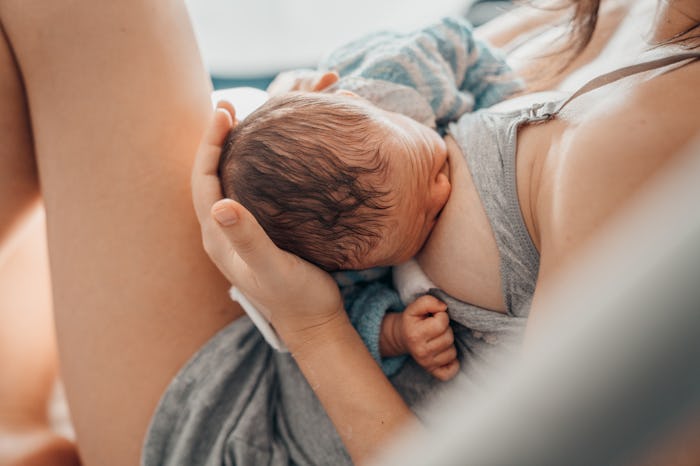News

A New Study On Breastfeeding & COVID-19 Offers Helpful Insight
If moms wear face masks and follow other safety precautions, a new study on breastfeeding and COVID-19 has found that mothers are unlikely to pass the virus to their newborns if they have been infected with the coronavirus.
The small observational study published last week in The Lancet Child & Adolescent Health looked at neonatal management during the pandemic and found that "if correct hygiene precautions are undertaken," breastfeeding is safe "when paired with effective parental education of infant protective strategies."
"We know that skin-to-skin contact and breastfeeding are important both for mother-infant bonding and for long-term child health," study co-author Dr. Patricia DeLaMora explained in a press release shared with Eurekalert. "Our findings suggest that babies born to mothers with COVID-19 infection can still benefit from these safely, if appropriate infection control measures are followed."
For the study, researchers observed 120 babies who were born at three New York City hospitals to 116 mothers who tested positive for COVID-19 at the time of delivery. All of the babies tested negative for the virus at the time of birth. The newborns were allowed to sleep in enclosed cribs in the same room as their moms, although at a safe distance of six feet apart. When mothers breastfed, they wore surgical masks and followed safe hand hygiene and breast washing procedures.
Of the study's original sample size of 120 babies, 82 completed a follow-up exam a week later and none tested positive for the virus. During that same time-frame, 83% of the babies roomed with theirs mothers and 78% were still breastfeeding, according to the study. And 14 days later, 72 babies were tested again with a nasal swab and, again, researchers found that none came back positive.
"Our data suggest that perinatal transmission of COVID-19 is unlikely to occur if correct hygiene precautions are undertaken, and that allowing neonates to room in with their mothers and direct breastfeeding are safe procedures when paired with effective parental education of infant protective strategies," researchers concluded in the study.
It's important to note that researchers said in the study that the babies were only tested for the virus with a nasal swab and they were "unable to screen for presence of the virus in blood, urine, or stool due to absence of approved testing for these samples during the study period." And because researchers relied on mothers to report on "hand hygiene and mask usage at home," they noted in the study there is "the potential for recall bias."
One of the study's authors, Dr. Christine M. Salvatore of Weill Cornell Medicine-New York Presbyterian, told CTV News that because "data on the risk of COVID-19 transmission during pregnancy or while breastfeeding are limited to a small number of case studies," the "guidelines for pregnant women and new mothers vary." Still, Salvatore told the news outlet that researchers hope their new study "will provide some reassurance to new mothers that the risk of them passing COVID-19 to their babies is very low."
According to recommendations from the World Health Organization (WHO) on COVID-19 and breastfeeding published in June, "mothers with suspected or confirmed COVID-19 should be encouraged to initiate or continue to breastfeed." The Centers for Disease Control and Prevention (CDC) has also issued the following guidelines for breastfeeding mothers with COVID-19:
- Wash your hands before touching your baby
- Wear a cloth face covering, if possible, while feeding at the breast
- Wash your hands before touching pump or bottle parts and clean all parts after each use
While this most recent study published in The Lancet offered positive news that transmission of the coronavirus through breastfeeding was unlikely, Salvatore told the BBC that "larger studies are needed to better understand the risks of transmission from mother to child."
Study referenced:
Salvatore, C. (2020) Neonatal management and outcomes during the COVID-19 pandemic: an observation cohort study, The Lancet Child & Adolescent Health https://www.thelancet.com/action/showPdf?pii=S2352-4642%2820%2930235-2
If you think you’re showing symptoms of coronavirus, which include fever, shortness of breath, and cough, call your doctor before going to get tested. If you’re anxious about the virus’s spread in your community, visit the CDC for up-to-date information and resources, or seek out mental health support. You can find all of Romper’s parents + coronavirus coverage here.